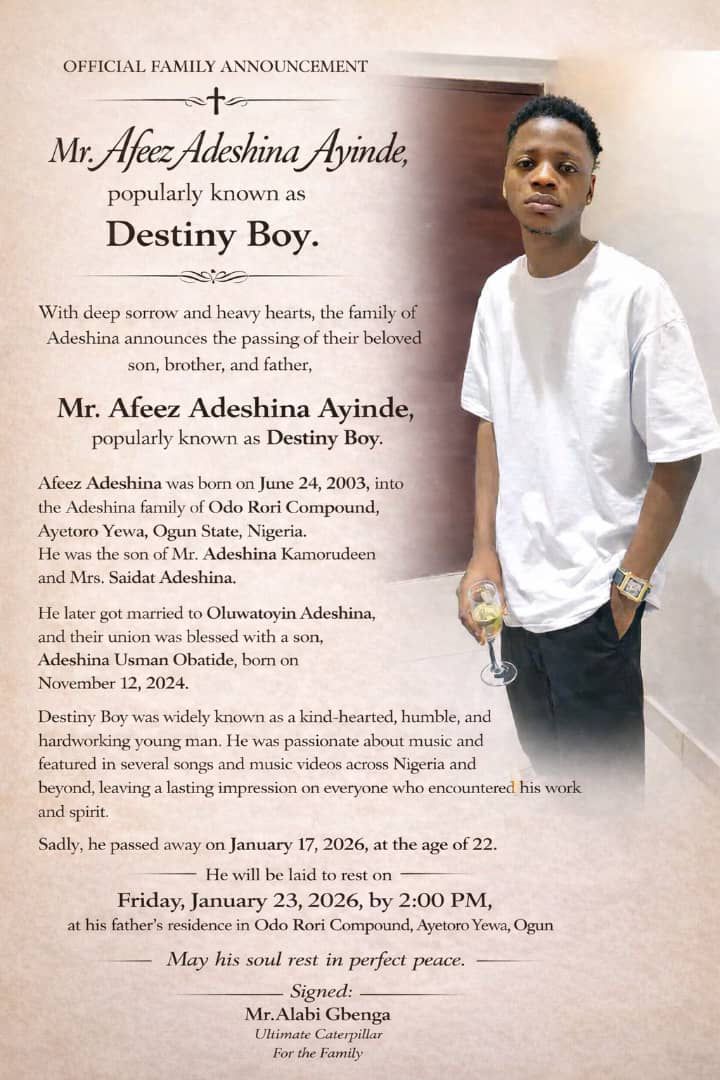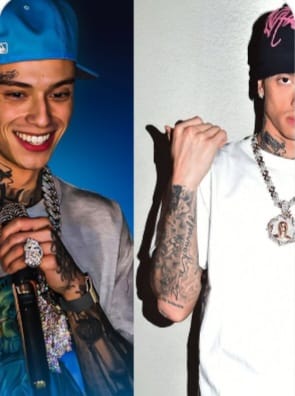Entertainment
The Dynamics Of Fuji Music Fandom And Artist Engagement : An Insightful Exploration” By Alhaji Arems

“The Dynamics Of Fuji Music Fandom And Artist Engagement : An Insightful Exploration”
By Alhaji Arems
Fuji music, a genre deeply rooted in Nigerian culture, has a unique and passionate fan base. As the CEO of Arems Entertainment, I’ve observed an intriguing pattern among Fuji fans: they often appreciate multiple artists across the genre, yet their loyalty is frequently tied to the distinct personalities of individual artists. This article aims to delve into the dynamics of Fuji music fandom, the influence of artist personality on fan loyalty, and the crucial role of artist-client relationships in the industry’s success.
Understanding Fuji Music Fans :
Fuji music enthusiasts often enjoy the works of various artists like K-1, Aare Sir Shina Akanni, Saheed Osupa, Ayuba, Obesere, Pasuma, Malaika, Atawewe, Taye Currency, Igwe Remi Aluko, Queen Tosin Eniba and others. However, the degree of loyalty each fan feels toward an artist can vary significantly. For example, a die-hard fan of K-1 De Ultimate might attribute 50% of their love for Fuji music to him, while distributing the remaining 50% among other artists. This isn’t to say they dislike other Fuji musicians; rather, they resonate more with the unique traits or character of their preferred artist. This affinity could stem from a personal interaction, shared values, or simply a deep appreciation for the artist’s style.
The Two Types of Fans ;
Fuji artists generally attract two types of fans: “true fans” and “eye service fans.” True fans are those who can engage the artist with honesty, offering constructive criticism when necessary. They are invaluable as they help the artist grow and remain grounded. On the other hand, eye service fans see the artist as infallible, always right, even when the artist is clearly wrong. This group often includes band members or workers who, for fear of losing their positions, avoid speaking the truth. The presence of eye service fans can be detrimental, as it fosters a culture where the artist is insulated from reality, potentially leading to arrogance and a disconnect from their audience.
Artist Personality And Industry Success :
The longevity and relevance of Fuji artists in the industry often hinge on their ability to accept feedback and remain humble. Artists who continue to thrive are typically those who listen to constructive criticism and value the opinions of those around them. They understand that, regardless of their fame, they are still human and can always improve. Conversely, artists who become too proud and refuse to heed advice often find themselves struggling to maintain their position.
The Importance of Artist-Client Relationships :
Another crucial aspect of an artist’s career is their relationship with clients and promoters. It’s not uncommon for Fuji artists to focus solely on their performance fees, neglecting the importance of building rapport with their clients. This approach can be short-sighted. When artists show genuine interest in the success of an event, by, for example, creating promotional audio jingles or video posts, they not only enhance the event’s chances of success but also build goodwill with the client. Such actions often result in repeat bookings and a positive reputation within the industry.
Unfortunately, some artists demand additional fees for promotional activities, which can deter clients from working with them again. The reluctance to support event promotion without extra charges can be a major reason why some artists receive fewer bookings than others. Artists who go the extra mile, even without immediate financial compensation, often find themselves more in demand and build stronger, more lasting careers.
Conclusion :
In summary, the world of Fuji music is as much about personal connections and relationships as it is about musical talent. Fans gravitate towards artists whose personalities they resonate with, while the success and longevity of an artist’s career often depend on their ability to stay humble and receptive to feedback. Moreover, artists who prioritize their clients’ success and actively participate in event promotion tend to enjoy more consistent bookings and a better industry reputation. This article serves as a guide for both established and upcoming Fuji artists, offering insights into the dynamics that can make or break a career in this vibrant genre.
By understanding these nuances, Fuji artists can navigate their careers more effectively, ensuring they remain relevant and cherished by their fans for years to come.
Entertainment
Nollywood Actress and Philanthropist Amb. Princess Chelsea R.C. Nwodo Appointed as Chief of Staff to AGN National President*

*Nollywood Actress and Philanthropist Amb. Princess Chelsea R.C. Nwodo Appointed as Chief of Staff to AGN National President*
Abuja, Nigeria – The Actors Guild of Nigeria (AGN) announces the appointment of Amb. Princess Chelsea R.C. Nwodo as the new Chief of Staff to National President, ALHAJI SANUSI ABUBAKAR YAKUBU. This strategic move underscores the Guild’s commitment to excellence and its dedication to fostering a more efficient and effective leadership structure.
Amb. Nwodo brings a wealth of experience and expertise to her new role, having served as a National Deputy Secretary (Emeritus) and demonstrating exceptional leadership skills and a deep understanding of the Guild’s vision and mission. A respected member of the Nigerian entertainment industry, she is also known for her dedication to promoting actor welfare and advancing the Guild’s interests.
*A Proven Track Record*
Amb. Nwodo’s appointment is a testament to her outstanding contributions to AGN and her commitment to serving the Nigerian film industry. Her philanthropic efforts and advocacy for social causes have made a positive impact on Nigerian communities, She’s also the CEO of CHELSEA NWODO’S FOUNDATION a foundation known for its unique cultural expression and alliance with many state government including Delta state government and so on.
*About the Actors Guild of Nigeria (AGN)*
The AGN is the governing body for professional actors in Nigeria’s Nollywood film industry, established in 1998 with over one million members across the six geopolitical zones of the federation. The Guild promotes actor’s welfare, protects their rights, and advances the Nigerian film industry.
Entertainment
From Drill to Deen: Central Cee’s Conversion and the Power of Faith in Modern Hip-Hop

From Drill to Deen: Central Cee’s Conversion and the Power of Faith in Modern Hip-Hop
By George Omagbemi Sylvester
“The British rap star’s public declaration of Islam sparks global reactions and renews debate about spirituality, identity, and influence in contemporary music.”
British rap superstar Central Cee has publicly announced that he has converted to Islam, a revelation that has rapidly spread across global media and social platforms, drawing reactions from fans, cultural commentators and religious observers alike. The development marks a deeply personal shift for one of the most influential voices in modern UK drill, and it highlights the growing intersection between faith, identity and popular culture.
Central Cee, whose real name is Oakley Neil Caesar-Su, disclosed the decision during a recent livestream, where he stated that he had taken the Shahada, the Islamic declaration of faith that formally marks a person’s conversion to Islam.
According to multiple reports published on February 6, 2026, the rapper confirmed the conversion publicly, saying he had changed his name and embraced Islam, with friends present during the broadcast congratulating him.
The announcement quickly became a trending global topic, with thousands of fans flooding social media with messages of support and congratulation.
What happened, when, where and how
The confirmed facts are straightforward.
What happened: Central Cee announced his conversion to Islam.
Who: The British rapper, born Oakley Neil Caesar-Su.
When: The announcement surfaced publicly on or around February 6, 2026.
Where: The declaration was made during a livestream, widely circulated online.
How: He confirmed he had taken the Shahada and embraced Islam, with friends present during the session.
Before this announcement, Central Cee had never publicly declared adherence to any specific religion, though fans had long speculated about his spiritual leanings.
Background: the rise of a global rap force
Born on June 4, 1998, in London, Central Cee rose from the streets of Shepherd’s Bush to become one of the most commercially successful British rappers of his generation.
He achieved mainstream recognition with his 2020 single Day in the Life and later dominated charts with hits such as Doja and Sprinter, accumulating billions of streams worldwide.
By the mid-2020s, he had become a defining figure in UK drill, blending street narratives with a polished, globally accessible sound.
Reactions and significance
The news of his conversion triggered widespread reaction across continents. Many fans congratulated him, using phrases such as “Welcome to Islam, brother,” reflecting the celebratory tone among supporters.
Others expressed curiosity about whether the decision would influence his music, public image, or future lyrical direction.
Cultural analysts note that religion has long played a quiet but significant role in hip-hop. From Malcolm X’s influence on American rap consciousness to the presence of Muslim artists in both US and UK scenes, faith has often shaped artistic identity.
British sociologist Dr. Reza Pankhurst, writing on religion and youth culture, has argued that for many urban artists, faith offers “a language of discipline, moral structure and belonging in environments often defined by instability.”
Similarly, American scholar Dr. Sherman Jackson has noted that Islam’s appeal among musicians and athletes lies partly in its “emphasis on personal responsibility, spiritual dignity, and community.”
While these are broader observations about religious influence in culture, they help explain why high-profile conversions often resonate far beyond the personal sphere.
Why the announcement matters
Central Cee is not merely another celebrity; he is one of the most commercially powerful voices in British rap, with global reach across Europe, Africa, Asia and North America. His decisions, therefore, carry symbolic weight.
When artists of such stature publicly embrace a faith, it often triggers three parallel conversations:
First, identity: Fans begin to examine how the artist’s beliefs align with their lyrics and public persona.
Second, influence: Younger audiences may view the decision as aspirational or spiritually significant.
Third, authenticity: Critics and supporters alike debate whether faith will reshape the artist’s artistic content.
British cultural commentator Kehinde Andrews has previously observed that hip-hop is “not just music but a social language through which young people negotiate power, race, faith and identity.”
In that sense, Central Cee’s announcement becomes part of a larger cultural dialogue not merely a personal declaration.
The question of a new name
Some reports indicate that the rapper mentioned changing his name after taking the Shahada, though details remain inconsistent across sources.
While certain online reports suggested possible new names, there is no universally confirmed official new name from the artist at the time of reporting.
This remains an evolving aspect of the story, and responsible reporting requires caution until a formal statement is released through verified channels.
The broader context: faith and hip-hop
Central Cee joins a growing list of artists who have publicly embraced Islam. Over the decades, figures such as Yasiin Bey (Mos Def), Lupe Fiasco, Ice Cube, and Q-Tip have either converted to Islam or drawn heavily from Islamic teachings in their music.
In the UK, Muslim identity has long been intertwined with the grime and drill scenes, reflecting the multicultural realities of cities like London, Birmingham and Manchester.
Cultural historian Tricia Rose, one of the foremost scholars of hip-hop, once wrote that the genre “has always been a site of spiritual searching, moral struggle and social commentary.”
In that context, a public conversion is not an anomaly but part of a longstanding tradition of artists seeking meaning beyond fame and commercial success.
What remains unclear
Despite the viral spread of the story, certain details are still evolving:
The exact location of the livestream has not been formally confirmed.
The identity of the individuals present during the Shahada has not been publicly verified.
Any official legal name change has not been documented in confirmed public records.
Responsible journalism requires distinguishing between verified facts and social-media speculation.
Final assessment
Central Cee’s conversion to Islam is a deeply personal decision that has nonetheless sparked global conversation. Announced during a livestream in early February 2026, the declaration places one of Britain’s most influential rappers at the centre of a broader discussion about faith, culture and celebrity influence.
In an era where artists are often defined solely by streaming numbers and chart positions, his announcement underscores a different narrative: the search for meaning, identity, and spiritual grounding in the midst of global fame.
As the late scholar James Cone once wrote, “Spiritual transformation is the most radical form of social change, because it begins inside the human soul.”
Whether Central Cee’s journey will reshape his music or remain a private source of guidance is a question only time can answer. What is certain, however, is that his decision has already stirred conversations that extend far beyond the world of rap.
Entertainment
Remembering Afeez Adeshina “Destiny Boy” : A Life of Promise, Music, And Quiet Impact ~ 1ST ELEVEN9JA TV

Remembering Afeez Adeshina “Destiny Boy” : A Life of Promise, Music, And Quiet Impact ~ 1ST ELEVEN9JA TV
By Alhaji Arems (Baba Fuji)
The Nigerian music scene is mourning the loss of Afeez Adeshina Ayinde, popularly known as Destiny Boy, whose passing has left a deep sense of grief among family, friends, and fans. Though his life was brief, his story is one marked by determination, creativity, and a steady rise driven by passion rather than noise. Destiny Boy passed away on January 17, 2026, at the age of 22, cutting short a journey that many believed was only just beginning.
Early Life And Background :
Afeez Adeshina was born on june 24, 2003, into the Adeshina family of Odo Rori Compound, Ayetoro Yewa, Ogun State, Nigeria. He was the son of Mr. Adeshina Kamorudeen and Mrs. Saidat Adeshina, raised within a close-knit family environment that shaped his values and character.
From an early age, Afeez was known for his calm demeanor and respectful nature. Those who grew up around him often describe him as gentle, focused, and quietly ambitious. Music became an outlet through which he expressed himself, long before public recognition followed. What began as interest and experimentation gradually turned into purpose.
Music Career And Creative Journey :
Known professionally as Destiny Boy, Afeez carved out his place in music through persistence rather than spectacle. He was deeply passionate about his craft and committed to growth, often collaborating and featuring in songs and music videos across Nigeria and beyond.
While he may not have been the loudest voice in the room, Destiny Boy earned respect for his work ethic and humility. He approached music with seriousness, seeing it not just as entertainment but as a path to building something meaningful. Colleagues and collaborators consistently describe him as hardworking, disciplined, and eager to learn — traits that set him apart in an industry often defined by fast success and fleeting attention.
His presence in multiple projects across different platforms reflected a steady upward movement. For many young creatives, Destiny Boy represented the quiet grind: showing up, improving, and letting the work speak.
Family Life And Personal Milestones :
Beyond music, Afeez embraced responsibility early in life. He got married to Oluwatoyin Adeshina, and their union was blessed with a son, Adeshina Usman Obatide, born on November 12, 2024. Becoming a husband and father added new depth to his life, grounding him further and reshaping his priorities.
Those close to him speak of his devotion to family and his desire to build a stable future. Balancing personal life with creative ambition was not always easy, but Afeez carried these responsibilities with maturity well beyond his years.
His Passing :
The news of Destiny Boy’s death on January 17, 2026, came as a shock to many. At just 22 years old, his passing raised a collective sense of loss — not only for what he had achieved, but for the potential that remained unrealized.
While details surrounding his death have been kept private, the impact has been deeply felt across his immediate community and within creative circles. Tributes have highlighted not only his music but his character: kind-hearted, respectful, and sincere.
Burial Arrangements :
The Adeshina family has announced that Afeez Adeshina Ayinde (Destiny Boy) will be laid to rest on:
Friday, January 23, 2026 :
Time : 2:00 PM
Venue : His father’s residence, Odo Rori Compound, Ayetoro Yewa, Ogun State
Family members, friends, colleagues, and well-wishers are expected to gather to pay their final respects and celebrate a life that, though short, left a meaningful imprint.
A Legacy Beyond Numbers :
Destiny Boy’s story is not one measured by chart positions or awards, but by consistency, humility, and quiet influence. He represented a generation of young Nigerian creatives navigating ambition, responsibility, and identity in real time.
In remembering Afeez Adeshina, many will recall a young man who showed up for his craft, valued his family, and treated people with respect. His journey serves as a reminder that impact is not always loud — sometimes, it is built patiently, one step at a time.
As he is laid to rest, his music, memories, and the lives he touched remain.
May his soul rest in perfect peace.
-

 celebrity radar - gossips7 months ago
celebrity radar - gossips7 months agoWhy Babangida’s Hilltop Home Became Nigeria’s Political “Mecca”
-

 society5 months ago
society5 months agoReligion: Africa’s Oldest Weapon of Enslavement and the Forgotten Truth
-

 society7 months ago
society7 months agoPower is a Loan, Not a Possession: The Sacred Duty of Planting People
-

 news7 months ago
news7 months agoTHE APPOINTMENT OF WASIU AYINDE BY THE FEDERAL GOVERNMENT AS AN AMBASSADOR SOUNDS EMBARRASSING










